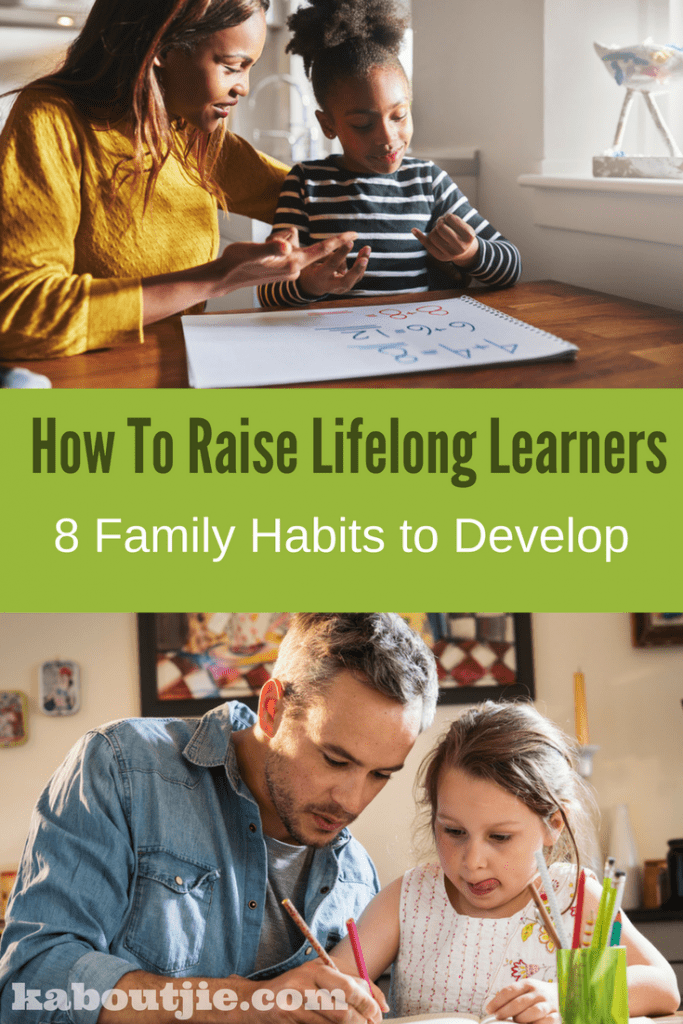There are people who call themselves eternal students. They never tire in finding opportunities to enrich themselves with new information or a fresh understanding of old ideas. And as enjoyable as the learning process can be, they make sure to take it quite seriously, whether it’s learning a traditional custom or a newly popular sport.
Learning clearly is a wonderful thing and the culture of learning should always start within the family. Parents should uphold the idea that raising lifelong learners is the same as raising life winners. Therefore, it’s imperative to cultivate values and habits that will encourage the young ones to look at learning as a strategy for leading a thoroughly enjoyable and fulfilling life.
If you are a parent and you want your children to become lifelong learners, you have to be deliberate about it. You need to start with yourself and demonstrate habits that embrace learning. When you are a good example to your children, you won’t even have to constantly tell them how important it is to study and improve themselves. They will easily follow your footsteps and discover your own motivation to learn as they come to understand what their own drivers for learning are.
Apart from being a good example to your children, there are other family habits that can cultivate a strong culture of learning in young people. Eight of them are provided below:

1. Remind everyone that learning is a source of “continuity.”
In this age of uncertainty, learning always helps to overcome the uncontrollable circumstances of life with accomplishments or know-how in various areas of life. Embedding this idea in the minds of your children will provide them the assurance that things will eventually be okay even when situations change drastically.
2. Treat learning as a good buffer between school or work and home life.
Before-school or after-school lessons should be provided as buffers and not as mere additional things to do. When learning is approached this way, all of you will always look at the activity as a source of excitement – something to look forward to no matter how stressful school and home life can be.
3. Keep an eye out for learning programs that can help beat life’s setbacks.
It’s crucial to look at learning as a way to solve your problems. Say, the kids are struggling in school; look for learning programs that can develop skills that aren’t properly honed yet.
Maths tutors in Dubai can help with “math phobia” and other concerns involving this subject. They design alternative methods for studying and alter the experience with math.
The bottom line here is that learning should be a form of rescue or help.
4. Intensify desires or interests through learning.
When any member of the family expresses the desire to learn something – even if you don’t find it useful or “necessary” – try to indulge it. Learning isn’t done only for personal growth; it should also be a source of joy.
Joy is crucial to have if you wish to improve your life, which is why so many lifestyle gurus talk so much about seeking out changes that spark joy. When learning one thing brings so much joy, it’s so easy for it to spread to other parts of life. It can motivate even more learning which, of course, will be a huge benefit to the person.
So, if your children, for example, decide that they want to study the Arabic language even if you’ll only be living in Dubai for a short while, let them take a shot at it. Perhaps they are interested in children’s Arabic tuition in Dubai that learning centers offer because they have friends who go. If this is the case, then gift them the opportunity because their desire for socialization in such an environment can actually provide them a big side advantage. Encourage their enthusiasm.

5. Entertain learning trends.
Most of the time, it’s better to have tried something at least once just to firmly establish if it’s useful or not. Not much is lost in giving something a try once. More often than not, learning trends end up being beneficial.
6. Turn trivial experiences into fun learning opportunities.
When you have young kids who tend to rely too much on their mobile devices for information, take advantage of rare occasions wherein they are “unplugged” to introduce fun, traditional knowledge-sharing approaches.
For example, during a car ride, play traditional games that will allow everybody to share what they know. “I Spy” is one game that will encourage the little ones to be mindful of their surroundings and to hone their communication skills. Another game that kids can enjoy is the “Countries and Capitals” game – they’ll learn basic geography and memorize details without always having to turn to Google.
7. As parents, be firm on what would benefit your children even if they’re not immediately eager for the experience.
Children may not be too enthusiastic about taking lessons, but if you believe that it’s necessary for them to take part in such programs, then insist on them. As parents, you have a better grasp of what can benefit the little ones; exercise your authority to ensure their advantage.
8. Reward good performance and provide other forms of motivation.
Nothing can drive people to study harder like rewards can because they provide instant gratification. The long-term impact of learning is definitely more beneficial, but you can get the young learners to commit for the long haul with instant gratification simply because that’s how people are psychologically wired.
Life presents many opportunities for both young and old to grow and improve. Use as many of these opportunities as you can to continuously feed the desire or need to learn. Learning is something that everybody has to do all the days of their life. Through it, problems are solved and joy is created.
So, develop these habits in your family and raise lifelong learners who will see life as an exciting adventure of challenges that they have the natural means to overcome in order to grow into the people they want to become.
About The Author
Bushra Manna is one of the founders and Principal of Leaps and Bounds Education Centre – Motorcity. She has 20 years experience teaching the British and American curricula internationally at primary level – early middle school level, ages 4-12. Bushra has a passion for teaching and started her teaching career as an assistant teacher for 2 years, during which an autistic boy was appointed to her care within a mainstream classroom setting. Working with Ismail, opened her eyes to the significance of 2 crucial elements: knowing a child’s best learning style and having an individualized approach to teaching and building a child’s self-confidence to ensure their psychological well being.
Bushra believes in imparting deep learning to a child and not just rote learning, which is why she recommends the Magikats program at her center, to promote a genuine understanding with its multi sensory, differentiated and interactive approach within a small group setting. “ At the center we cater for children needing support, those with special learning needs and the gifted, addressing the individual need of each child”.
 Kaboutjie SA Mommy Blogs by Lynne Huysamen
Kaboutjie SA Mommy Blogs by Lynne Huysamen





Do helpfull, a must read thank you
What great tips! Learning is important even as an adult. You have be willing to learn. You lean everyday as no one knows it all. These are good life skills to teach our kids from young as it will help them throughout their life.
great tips lynne, thank you. i enjoy teachiing my kiddo, we also applaud when she gets something right and she gets super excited
thank you for these wonderful tips. I am a lifelong learner who was taught this by my father. I am trying to instal this into my son’s too one day
Thank you for these tips it is helpful. I am currently doing worksheet activities for my 3 year old we do “school” every day so this is super helpful for me to help him prepare and progress
That’s awesome that you are doing educational activities with your son 🙂